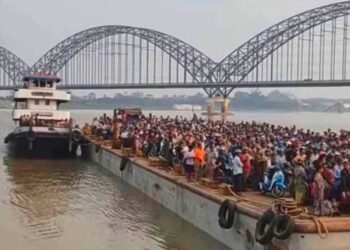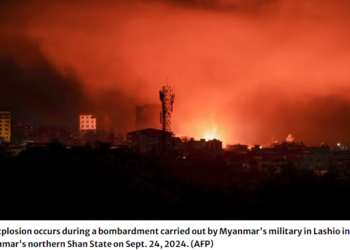Raven and the team were almost finished affixing the bombs to the drones in preparation for an attack on junta forces in Myanmar’s southern jungle when the accident occurred. A devastating series of explosions decimated the squad, leaving many dead or with life-altering injuries in the worst such disaster to hit any of Myanmar’s armed resistance groups so far this year.
Raven (Kyee Kan in Burmese) was just a short distance away when a shock was felt and then nearly two dozen bombs exploded, just five minutes before the drones were due to take off.
The first blast was so loud it deafened him, leaving him unable to hear the subsequent explosions. A huge orange ball of fire engulfed him and his young brother Hein Htet, another member of the team, the blasts knocking them spread-eagled to the ground.
Hein Htet was making a final check on a drone and was nearest the bombs when they exploded. Raven tried to reach to his brother but immediately collapsed to the ground as one of his legs was shredded, before losing consciousness.
When he came to, he learned that his brother had been killed on the spot and that his leg would have to be amputated.
Six of the team members were killed and five injured in the explosions.
Frontline attack unit
The drone attack unit—which before the accident consisted of 13 members, mostly in their 20s—had always been on the front lines, bravely fighting against the powerful regime with their drones in Karen State, where clashes are reported almost daily.
They used the aircraft to scout enemy positions, bomb and ambush junta bases and patrols, destroy regime forces’ heavy weapons, and help resistance fighters find advantageous positions and claim battlefield success against heavily armed junta soldiers.
Raven, a 29-year-old resistance fighter, said he had no regrets at all over the loss of his beloved brother and one of his legs, as he had prepared himself for any eventuality when he took up arms. In addition to having a leg amputated, he still has a piece of shrapnel in his head, and has required abdominal surgery and treatment for a burned arm.
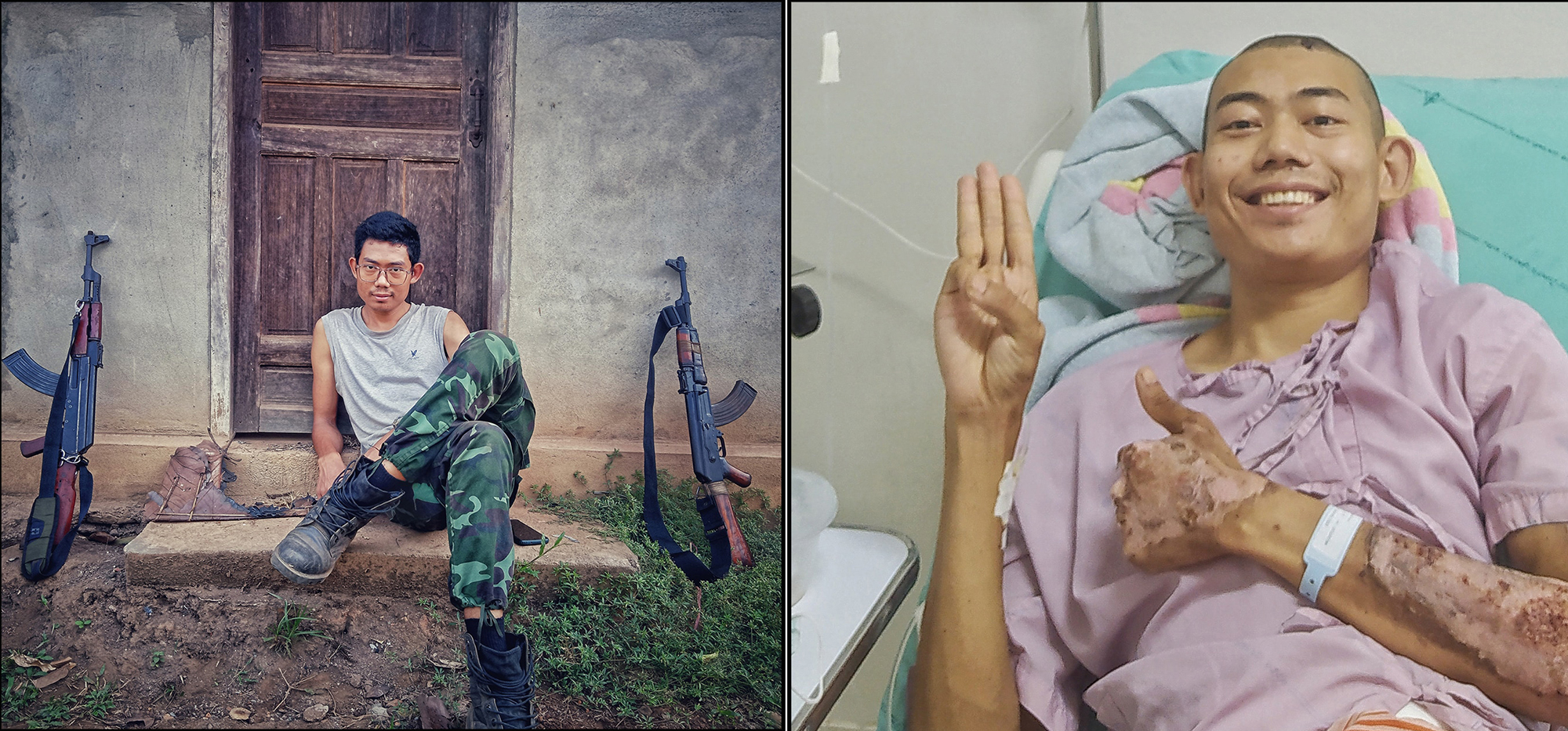
“We both knew that we could die any time, but made up our minds to fight,” he said.
After the military seized power in a coup on Feb. 1, 2021, toppling the civilian government, thousands of young people from across the country sought training from ethnic armed groups and took up arms to defeat the barbaric military regime. They are now known collectively as the People’s Defense Force (PDF), the armed wing of the parallel civilian National Unity Government (NUG).
The armed resistance is still going strong and can claim considerable success after more than a year-and-a-half of combat, but the PDFs, fighting alongside allied ethnic groups in Myanmar’s various states and regions, are paying a heavy price for it. According to data from the NUG’s Ministry of Defense, at least 1,500 resistance fighters have died in the clashes, and more than a thousand have been left with serious injuries they will carry for the rest of their lives.
Now, Raven and the other team members wounded in the accident are sheltering in a safehouse, undergoing surgery and receiving treatment for their injuries.
While their bodies are scarred and their movement has been affected by permanent injuries, their determination to uproot the military dictatorship—the goal that their fallen comrades couldn’t reach—remains vividly apparent, and is matched by the sacrifices and determination of resilient resistance fighters nationwide who have willingly given up everything to fight for their country and for democracy.
Revolutionary brothers
Until last year, brothers Raven and Hein Htet, 25, were professional videographers with handsome incomes and promising careers.
Their interests were in videography, gadgets and production. And among those whom they captured on video are Myanmar’s now detained elected leader Daw Aung San Suu Kyi, other public figures, business elites and celebrities. Both also dutifully cast their ballots for Daw Aung San Suu Kyi’s National League for Democracy (NLD) in the 2020 general election, hoping for a better future.
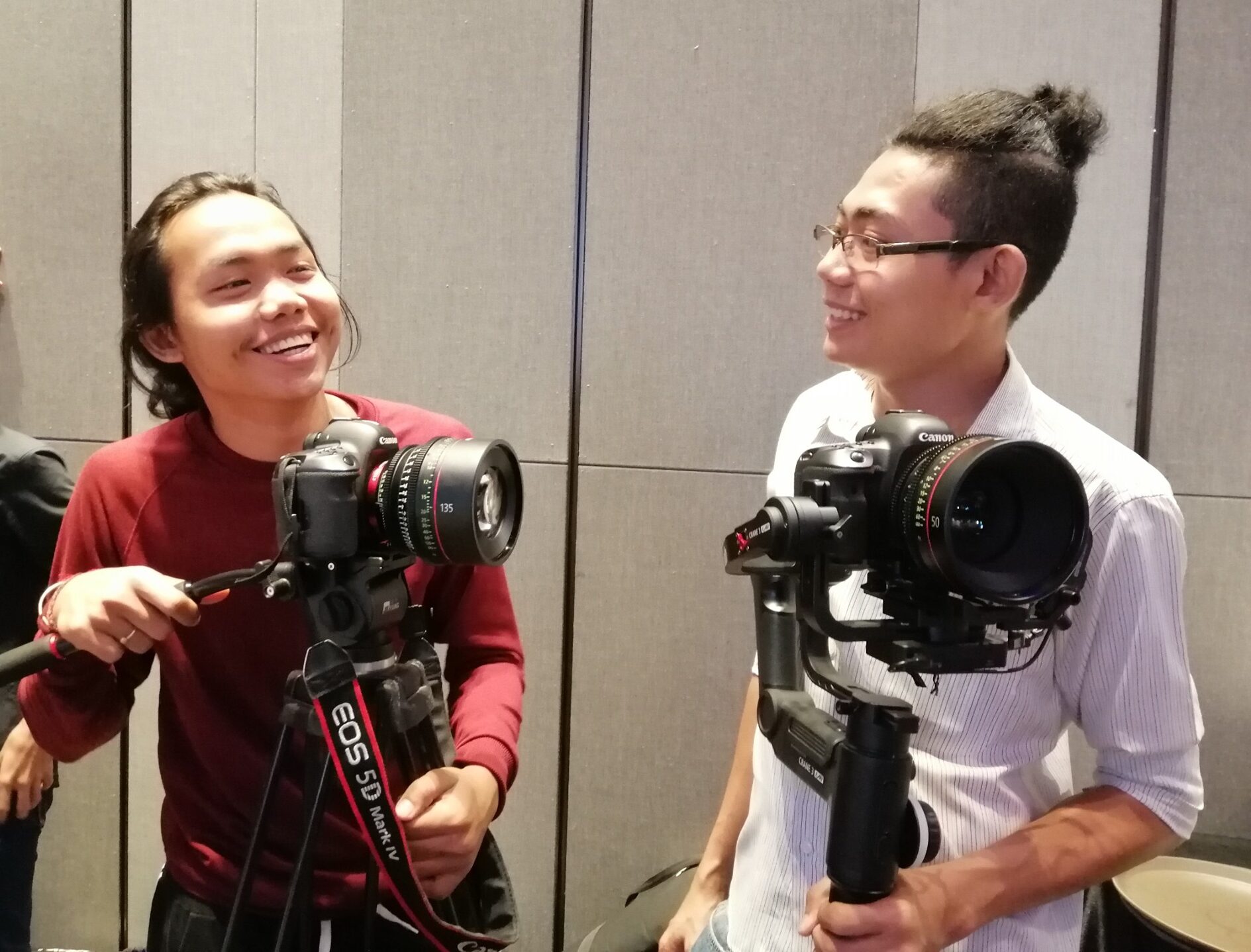
But their life story dramatically changed when the military seized power, overthrew the democratically elected civilian government and arrested State Counselor Daw Aung San Suu Kyi and President U Win Myint.
The two left behind the career they loved and joined the resistance. At first, they took part in street protests, demonstrating peacefully. But after the military ignored the people’s voice—as it always has—and started cracking down on protesters with deadly force, they were among those members of the defense teams who stood at the front of the columns to defend their fellow protesters in Yangon with makeshift barricades, smoke bombs and Molotov cocktails.
Later, the pair decided to take up arms as the junta’s killings of unarmed civilians and peaceful protesters mounted day by day.
Raven has a wife and two young daughters, while Hein Htet lived with and closely cared for their mother, who is sick with the last stages of liver cancer.
Vowing to topple the military dictatorship, the two left their homes in April 2021 and joined the earliest batch of young people who underwent military training with the Karen National Union in a jungle. After training, they became members of an urban guerrilla force in Yangon.
Raven recalled one occasion on which, as guerrilla fighters, they came close to being caught. Both were prepared to attack the junta forces with all the explosives they had and blow themselves up, rather than allow themselves to be arrested and killed. Only around 50 out of 200 trained fighters from their batch remain now; the others have all been arrested or killed, or gone missing.
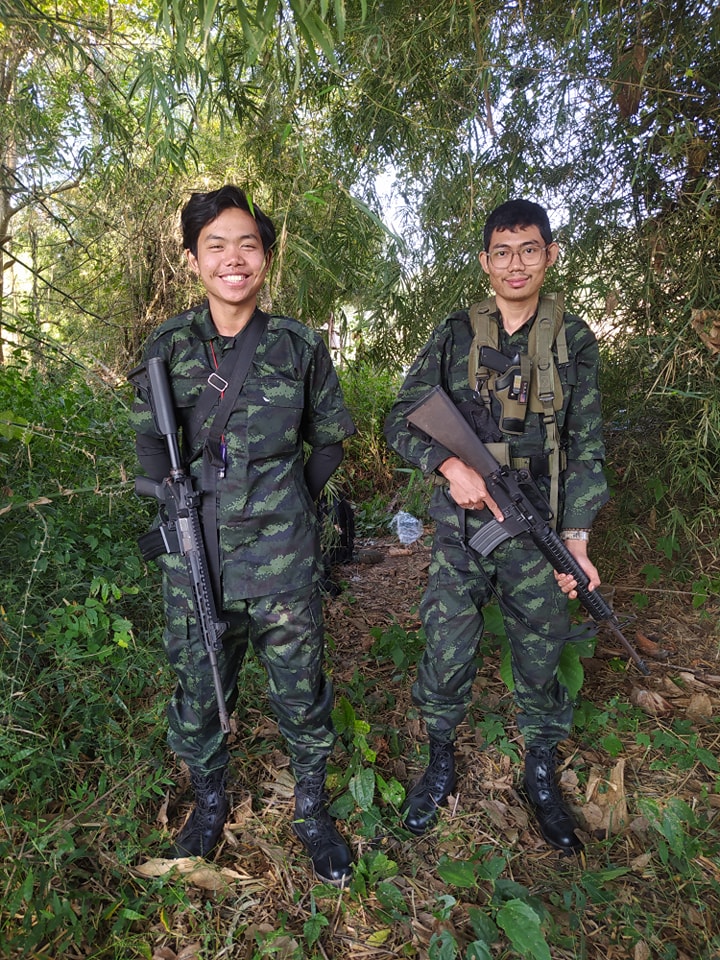
In August 2021 the two, both tech savvy, returned to a jungle camp with the idea of using their knowledge of civilian drone technology in battle against the better-equipped junta troops.
Drones designed to support cameras are increasingly being adapted by PDFs amid reports of successful attacks on junta forces both inland and on water. But the testing and attaching of high-explosive bombs to drones carries great risks.
Raven said that when it comes to manufacturing weapons as well as adapting drones for warfare, while the military has established safety protocols, as well as research and production infrastructure, the PDFs have no such capacity, lacking experience, funds and materials.
“Many [resistance fighters] are injured or killed by their own weapons, as we have to make them on our own,” he added.
Their mother was informed of her sons’ fate on the day of the accident. She responded by expressing pride in the sacrifices made by her two brave sons for the revolution. Her single wish for them was: “May the revolution succeed at the soonest.”
Six months since the accident, the NUG has yet to issue a letter honoring the group’s fallen heroes, including Hein Htet, although the team reported the accident and casualties, according to members.
Meanwhile, unbowed, Raven continues the fight against the junta in whatever way he can.
‘Never give up your dreams’
Since he is still hospitalized, he has busied himself by doing work to help other drone teams, such as arranging to distribute instructional materials for equipment, and helping them to find funds.
He helps set up drones and solves technical problems for fighters on the ground in conflict areas.
Working with Wild Boar, another team member who also lost a leg in the accident, he also creates content including a food vlog and a line of food products under the name “Sar Bal Gyi” (“Mr. Glutton”) for Click to Donate, an online platform where anyone can click on links posted by them and make donations in aid of the revolution.
Repurposing his videography skills, Raven now shoots and edits the vlog “Sar Bal Gyi” hosted by Wild Boar in which the latter cooks, eats and talks with guests, posting the programs on the platform.
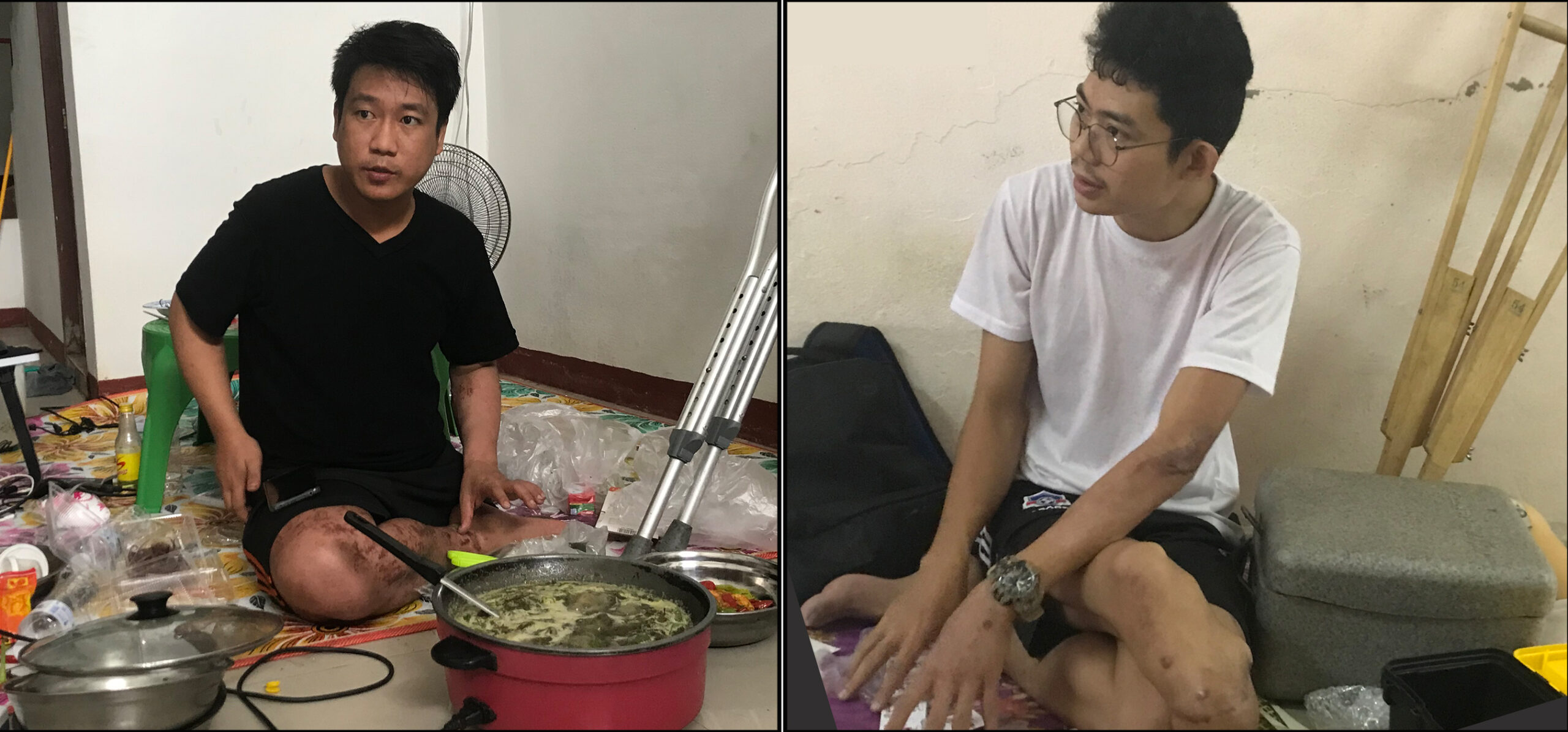
Raven said the aim of the program is to motivate people suffering daily atrocities under the military regime, showing that even those who have lost limbs can continue to pursue their dreams, remaining strong and supporting the revolution.
They also help to sell the Sar Bal Gyi line of food products to raise funds for armed resistance groups. The proceeds are used to fund the program, cover the rehabilitation costs of wounded fighters, and support resistance groups, he said.
Trying to support resistance fighters from behind the scenes doesn’t fully satisfy Raven, however; he is eager to get back to the front when he is strong enough.
“I don’t want to bequeath this [military dictatorship] to my daughters; instead I want to leave only good for them,” he added.
Resistance fighter-turned-food blogger
The 27-year-old Wild Boar—the nickname was given to him by his comrades—suffered severe injuries to his leg, arm and face during the explosions on April 6, with his leg amputated at the hip.
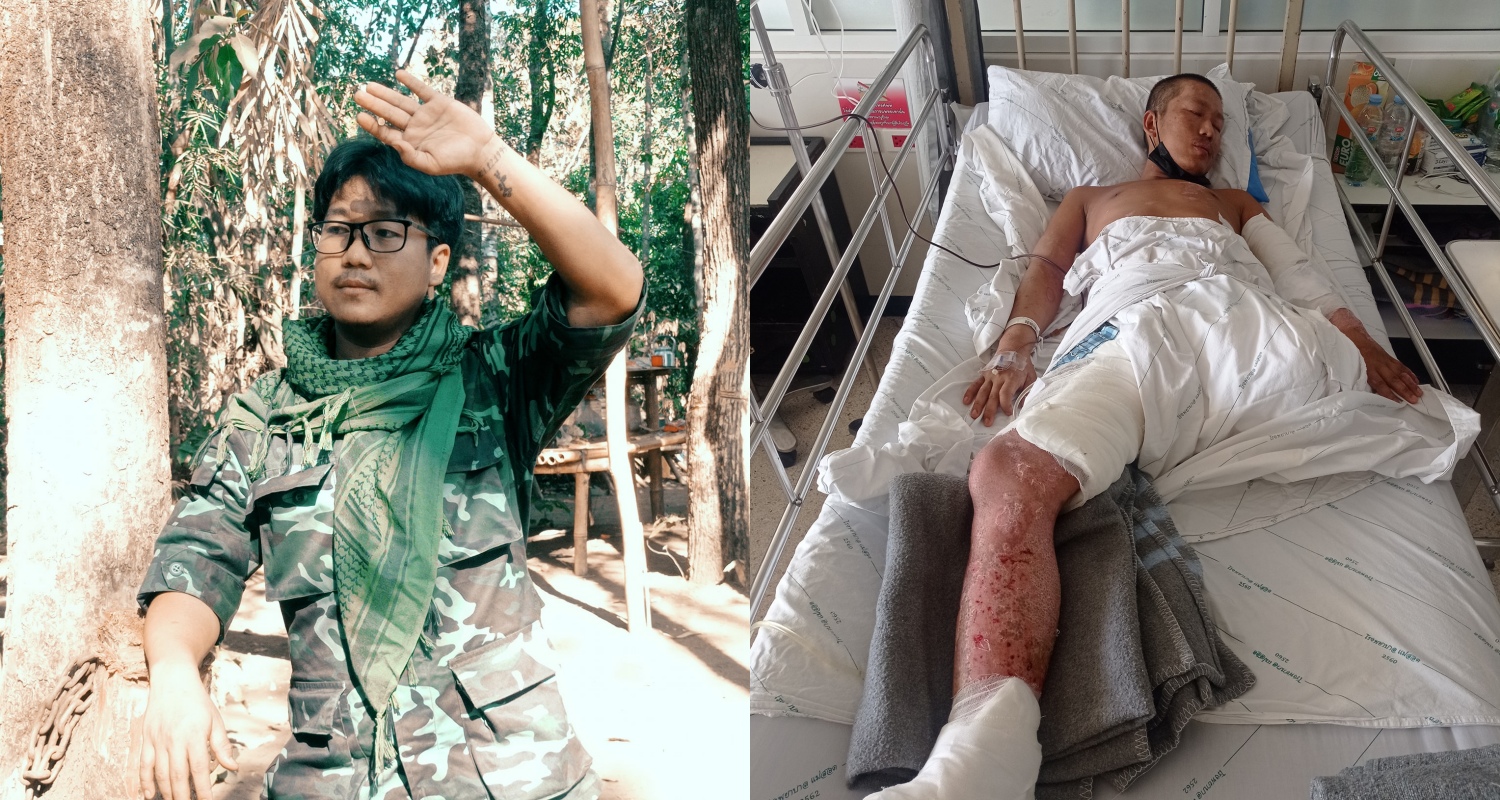
He initially wanted to die, so bad was the pain of his wounds. But after seeing a resistance fighter who lost both legs and an arm, but who refused to dwell on his losses and kept smiling, he decided he had to move forward.
Eschewing crutches and hopping around on one leg inside the safehouse, which he shares with other wounded resistance fighters, Wild Boar now energetically cooks and hosts eating shows for the “Sar Bal Gyi” program, doing his part to support the frontline fighters.
Wild Boar talks about how he happened to start the ‘Sar Bal Gyi’ program.
But unlike other food vloggers, sitting for long periods is hard for Wild Boar. He once suddenly lost his balance and fell on the floor while filming an eating segment for the show.
He refuses to let the loss of a limb get him down, however
“I take it as a badge of pride and whenever look at it [where his leg used to be], I want to prevent people from facing the same fate as me and grow more determined that they [the dictators] must be uprooted.”
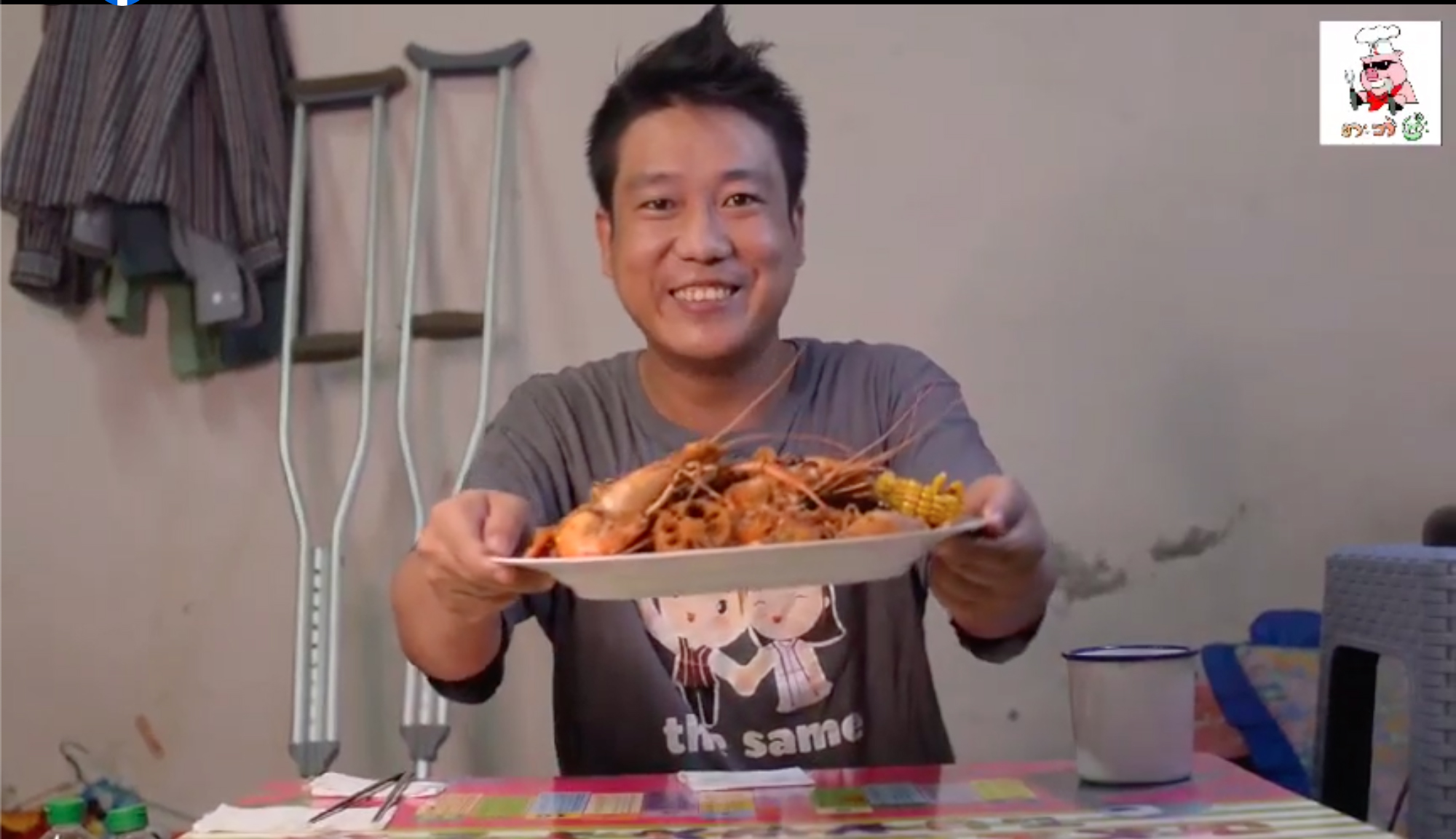
‘Our blood is not pink, it’s red…’
Before the coup, freestyle rapper Tikyi, 21, was only interested in rapping. American rapper J Cole is his idol. And in the 2020 general election, he exercised his right as a first-time voter, casting a ballot for Daw Aung San Suu Kyi’s party.
When the military annulled the election results following the coup, Tikyi felt it was unacceptable and joined the protests. In a crackdown on anti-coup protesters, he lost the person who was closest to him in the world—his younger brother—at the hands of junta soldiers.
His brother, 18, who had just finished high school, was gunned down and killed by junta troops in Yangon in a brutal crackdown on an anti-coup protest shortly after the takeover.
They were warned by their parents of the danger of being shot, and even killed, before joining the protest, but Tikyi remembers his brother telling him that, while he was aware of the risks, “My brother, our blood is not pink, it’s red. We won’t give up.”
Tikyi’s brother was in the defense line at the front of the protest column chanting democracy slogans when junta forces started firing on the protesters. A bullet pierced the makeshift shield with which he was covering his body. He picked up his blood-soaked younger brother and rushed him to an ambulance, but on the way to a hospital, the young man died.
Tikyi later underwent military training in Sagaing Region and became a guerrilla fighter operating underground for several months in Yangon and carrying out successful missions against junta targets. After several of his comrades were arrested, he returned to the jungle camps.
“We don’t want the next generation to suffer like us. If we don’t win this time, they will have to live through abuses and oppression for their whole lives,” Tikyi said, explaining his motivation for joining the armed resistance.
While on a mountainside undergoing training to become a commando, Tikyi fell and struck his waist on a rock. But it was only the next morning, when a superior struck him in the same area with a wooden rifle as punishment for having poor posture during drills, that he realized he was seriously injured.
Now receiving treatment in a safe place, he shared his determination to go back once he recovers to fight against the regime.
“I will continue to fight them,” he added. But Tikyi pointed out that in order for the revolution to succeed, the NUG leadership needs to bring the many different resistance groups together.
“We have the people. We have spirit and belief. What we need is unity to overthrow them.”
In his free time the rapper-turned-freedom fighter still composes and raps about the revolution and the feelings and emotions shared by himself and his comrades.
Food vendor-turned-determined fighter
“Only if those demons are eradicated, will we be free,” insisted Ko Aung Gyi, an ethnic Karen from Ayeyarwady Region.
Before the coup, he sold crispy fried pork lard in Yangon, making a good living out of it.
“We enjoyed freedom and even received support from Amay Suu [Daw Aung San Suu Kyi]’s government during the pandemic. But it was all destroyed by the coup,” he said.
“Those guys are really bad. Because of them, our people are in deep trouble,” he continued.
Angered by the coup, which overthrew the civilian government for which he voted so that it could continue to rule for a second term in 2020, he took part in peaceful protests following the military takeover, and later joined the armed struggle to uproot the military dictatorship.
“When we win, I want the [ousted] civilian government to return to power,” he said.
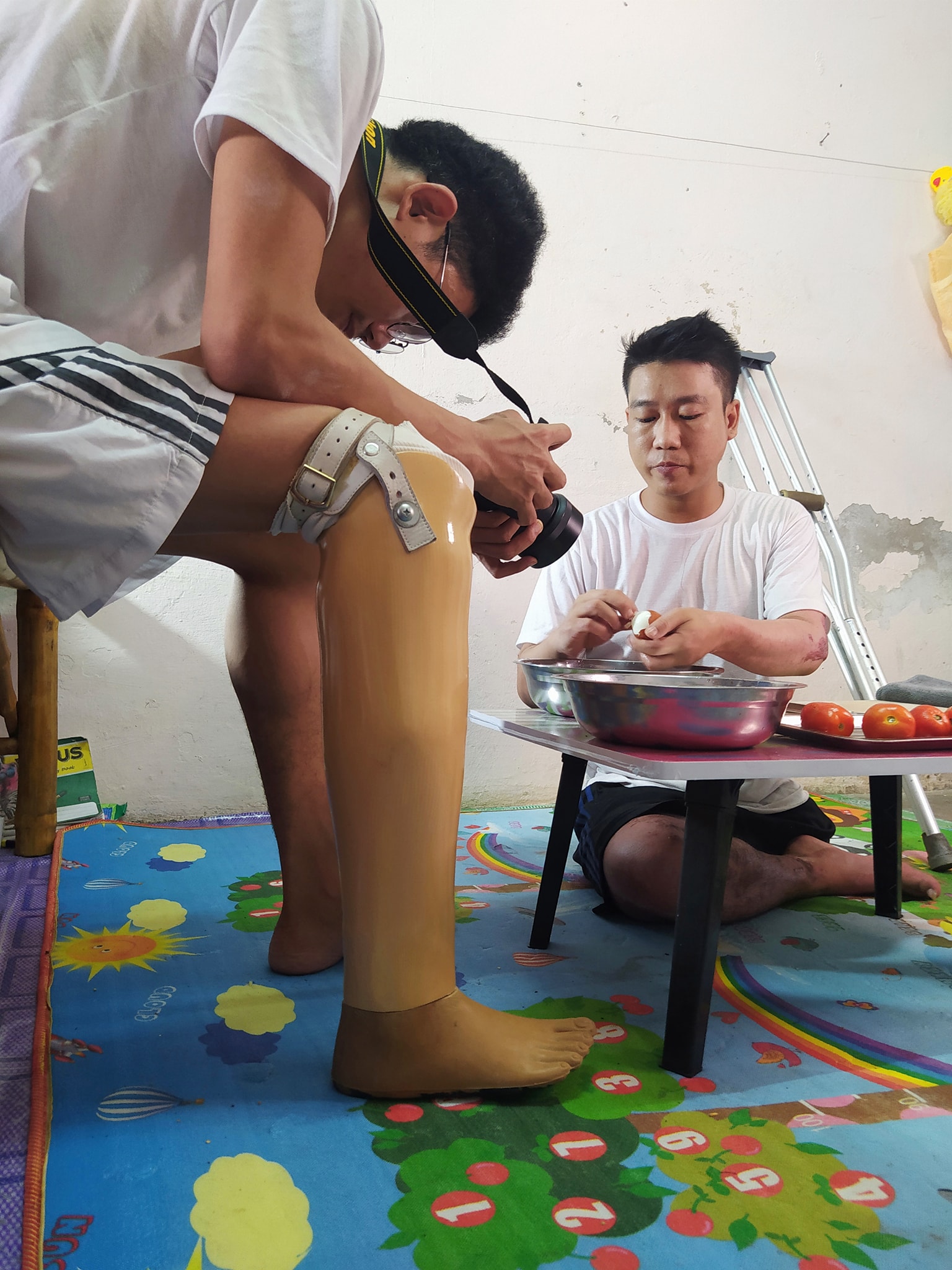
On April 4 this year, he was hit in the head by shrapnel from heavy artillery shells fired by junta forces as his column was attempting to ambush a junta base in Karen State.
He went into a coma and lay in bed for nearly two months. His friends said he escaped death by sheer luck. But the injury still affects his nervous system, causing him difficulties with speaking and moving.
“I will never surrender. I will fight them again once I recover,” the 33-year-old ethnic Karen said, struggling to speak each word one by one.
Bago resistance fighter
Nway Oo, who was a member of the same team as Raven, dreams of being a chief minister in his native Bago Region and working for the people. He was a campaigner for NLD candidates in Bago ahead of the 2020 general election.
If not for the coup, Nway Oo would never have had reason to take up arms. He said he had to break up with his long-time girlfriend, who disagreed with his decision to join the armed resistance.
A close friend of fallen comrade Hein Htet, Nway Oo was among those injured in the April 6 accident. He was hit in the foot and lower waist by shrapnel from the explosion. Before the blast, he could walk for the whole day in the jungle. Now, he can’t walk for longer than one hour.
Nway Oo now volunteers for radio programs, reporting on the fighting and the junta’s atrocities in resistance strongholds.
He shared his comrades’ confidence that the junta will surely be defeated. “And it will be quick if all play their roles dutifully,” he added.
He’s not alone in believing the revolution will prevail, and that, sooner or later, the Myanmar people will have their stolen liberty, rights and everyday lives restored to them.
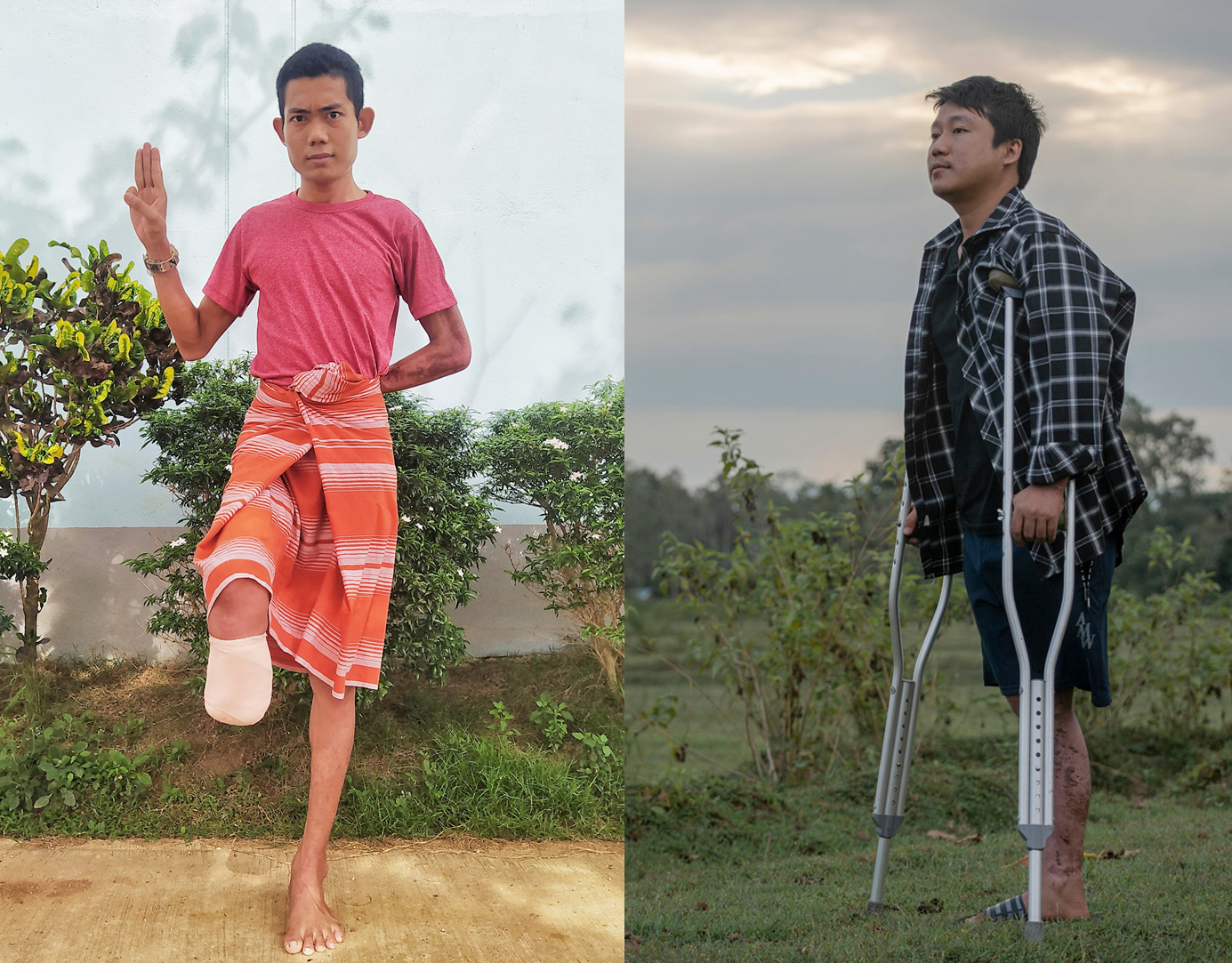
“We will fight till we win and end this [military dictatorship] in our generation,” Raven said.




